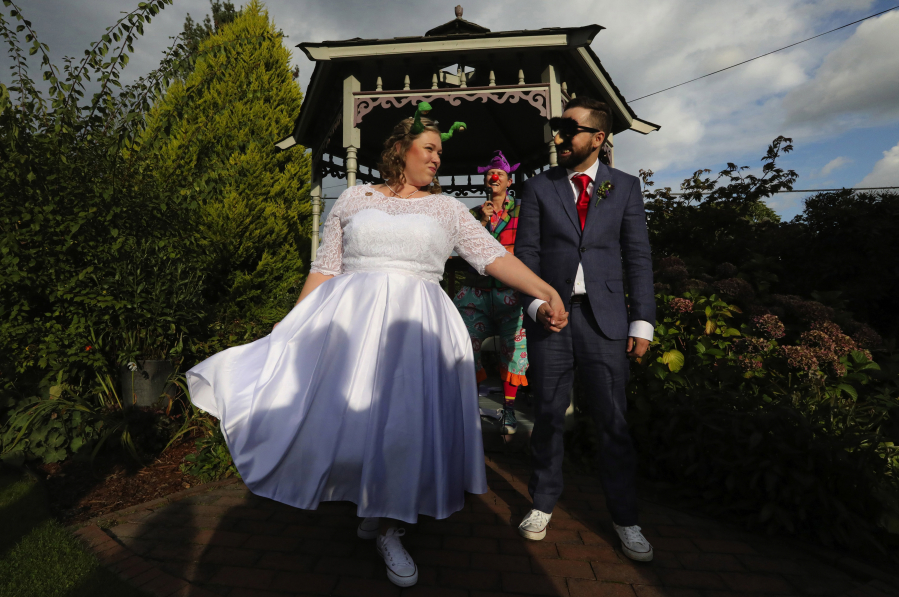SEATTLE — When Erika Dudra moved to Beacon Hill two years ago, she didn’t know any of her neighbors. The young chiropractor had just separated from her then-husband and found herself alone in her house with a 3-month-old she needed to feed and clothe.
Dudra soon discovered a Facebook group called Buy Nothing Beacon Hill North. The premise of the group was simple: Offer up something that you don’t need, or ask for something you do need.
She joined to get rid of a couch, but then started asking for baby things. As a result, “I have a 2-year-old now who basically cost me nothing,” she said.
When Dudra remarried on Sept. 21, she threw a “Buy Nothing wedding” with a donated dress, cake, decor, flowers, an American Sign Language interpreter for deaf relatives and a wedding photographer. Her biggest outlay was $300 for the venue.
To participants, Buy Nothing is about more than just fighting consumer culture, though. Today, all of Dudra’s best friends are people she met on Buy Nothing. Every time she walks down to her local coffee shop, she sees someone she knows from the group.
She is one of almost 47,000 Seattleites who are part of a Buy Nothing group in their own neighborhoods. Since this network was started in 2013 by two Bainbridge Island women, members and volunteers have spread the Buy Nothing gospel to more than half a million people in 20 countries, from the Philippines to Luxembourg.
Dudra herself has a goal of offering up a gift every day. “The more you participate in the project, the more you get out of it,” Dudra said.
How it began
Buy Nothing co-founder Liesl Clark likes to say the project is one-half internet giveaway group and one-half prehistoric Himalayan economics.
Local internet giveaway groups are nothing new: Craigslist launched its “free” section around 2000, according to a Craigslist spokesperson. Arizona resident Deron Beal started The Freecycle Network in 2003 after a fruitless quest for a thrift store or friend to take a mattress he didn’t need; today, the site claims more than 9 million members.
Bainbridge Island’s local Freecycle site is where Liesl Clark met Buy Nothing’s other co-founder, Rebecca Rockefeller, who runs a Bainbridge nonprofit. But while Freecycle’s goal is mostly to avoid waste, Buy Nothing has a more esoteric inspiration.
This inspiration comes from high up in the Himalayas, where Clark has filmed archaeology documentaries for National Geographic and the PBS series “NOVA.” In 2007, Clark visited a village in the Upper Mustang area of Nepal that didn’t operate on currency.
“Your money is no good there,” Clark said.
Instead, the village of Samdzong operated on a “gift economy” — when a villager needed something, she or he would simply ask. Residents kept communal goats and sheep and took turns watching each other’s fields.
Clark brought clothes to give away, but she was confused when an old, childless woman asked her for a pair of baby shoes. Villagers said the old woman should have something she could give to someone else, so “she can share with the neighbors and be tied to them.”
Coming back to the U.S. with this new idea filling her head, Clark became more frustrated with Freecycle, which has close to 2,000 Bainbridge Island users.
“It wasn’t ‘giving’ — it was posting what you want to get rid of,” Clark said.
One day, Clark scrolled past a Freecycle post for “curly sticks” from a corkscrew willow tree.
“Who would give away sticks?” Clark thought.
That’s how she met Buy Nothing co-founder Rockefeller. The two started seeing each other because of Freecycle more and more.
“The weird things I offered, she wanted,” Rockefeller said, “and the weird things she offered, I wanted.”
They shared a passion for anti-consumerism, which is where the group’s name comes from: “We really needed to stop buying stuff — just buy nothing,” Clark said.
They started talking about launching their own project through Facebook. With Facebook, users could see names instead of handles, and the rules were much more flexible. They could be as silly as they wanted.
One morning in July 2013, Rockefeller started a Facebook group at 10 a.m. By noon, the group had 300 people, Rockefeller said.
Clark’s first offer was a dozen eggs from her chickens, and a neighbor she’d never met named Susan Sellen commented, asking for them. As Clark walked up to Sellen’s house, she pulled out her camera and filmed Sellen opening the door. She later posted the video to YouTube with the title “Introducing the Buy Nothing Project.”
“I’ve lived here for years and I don’t go out and talk to anybody,” Sellen tells Clark in the video. Years later, the two still meet up for tea.
Explosive growth
Buy Nothing grew exponentially. Within a month, there was a sister group in North Kitsap, then one in California, then Seattle. By the end of 2013, 57 groups totaled 10,000 members across the U.S. Then, Buy Nothing spread to Canada, Australia, New Zealand, and the U.K.
Washington remains the U.S. state with by far the strongest following: 187,719 members in 293 groups, according to Buy Nothing volunteers.
As the number of members grows, groups have to divide like cells, to keep notifications manageable. Lissa Jagodnik, who helps manage Seattle’s groups, joined the Southeast Seattle Buy Nothing group when it had 250 members in February 2014. Today, Southeast Seattle has seven groups totaling more than 6,200 members.



